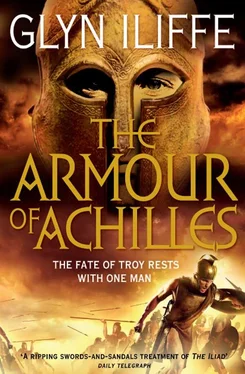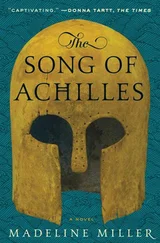Glyn Iliffe - The Armour of Achilles
Здесь есть возможность читать онлайн «Glyn Iliffe - The Armour of Achilles» весь текст электронной книги совершенно бесплатно (целиком полную версию без сокращений). В некоторых случаях можно слушать аудио, скачать через торрент в формате fb2 и присутствует краткое содержание. Год выпуска: 0101, ISBN: 0101, Издательство: Pan Books, Жанр: Старинная литература, на английском языке. Описание произведения, (предисловие) а так же отзывы посетителей доступны на портале библиотеки ЛибКат.
- Название:The Armour of Achilles
- Автор:
- Издательство:Pan Books
- Жанр:
- Год:0101
- ISBN:9781447205098
- Рейтинг книги:4 / 5. Голосов: 1
-
Избранное:Добавить в избранное
- Отзывы:
-
Ваша оценка:
- 80
- 1
- 2
- 3
- 4
- 5
The Armour of Achilles: краткое содержание, описание и аннотация
Предлагаем к чтению аннотацию, описание, краткое содержание или предисловие (зависит от того, что написал сам автор книги «The Armour of Achilles»). Если вы не нашли необходимую информацию о книге — напишите в комментариях, мы постараемся отыскать её.
The Armour of Achilles — читать онлайн бесплатно полную книгу (весь текст) целиком
Ниже представлен текст книги, разбитый по страницам. Система сохранения места последней прочитанной страницы, позволяет с удобством читать онлайн бесплатно книгу «The Armour of Achilles», без необходимости каждый раз заново искать на чём Вы остановились. Поставьте закладку, и сможете в любой момент перейти на страницу, на которой закончили чтение.
Интервал:
Закладка:
‘Odysseus,’ Eperitus called.
The king looked at him in confusion for a moment, as if startled from a dream, then dropped his sword back into its scabbard and walked towards his captain, forcing a smile.
‘Eperitus!’ he answered, almost sighing as a great tiredness seemed to press down on his shoulders. ‘Thank the gods you’re all right. I was concerned for you.’
‘Since when have you needed to worry about me?’
‘It’s a king’s prerogative to worry about his subjects,’ Odysseus replied, wiping the sweat from his brow and leaving a streak of clean skin through the accumulated dirt. He looked at Astynome. ‘I see you’ve gained a captive during your absence.’
Astynome drew closer to Eperitus, eyeing the king of Ithaca with distrust.
‘She captured me, I think. I saved her from being raped and now she’s placed herself under my protection.’
‘Well, girl, the gods must favour you,’ Odysseus said, speaking to Astynome in her own tongue and looking at her with kindness. ‘Of all the thousands of men in the Greek army, you were found by the one warrior who still retains a scrap of decency and honour. Anybody else would have left you to your fate – or added to your misery.’
Astynome frowned but said nothing.
‘And what of Apheidas?’ Odysseus continued in Greek, addressing Eperitus. ‘Did you find him?’
Eperitus nodded and lowered his eyes a little. ‘We fought in the temple of Artemis, where he gave me this.’
He pointed to the cut across his forehead. Odysseus reached up and pushed aside a lock of Eperitus’s hair with his thumb. He stared at the wound and winced, but a moment later his face was transformed by a smile.
‘Then you defeated him. He’s dead.’
Eperitus shook his head. ‘No. He mastered me easily. In fact, I’ve never met a swordsman like him. We fought when I was a lad, of course, but that was in the training yard, not for real. Perhaps that’s why I’ve always assumed I’d be able to beat him, because I’ve never really seen him fight. But today I did, and he could have killed me any time he wanted to.’
‘So why didn’t he?’
‘Because he wants me to join him in Troy! I thought I was hunting him, but it appears he came to Lyrnessus to find me . He knew about the assault, Odysseus. He knew I’d be here.’
Odysseus frowned, suddenly serious. He glanced at Astynome, who looked away.
‘How?’ he asked. ‘How could he have known you’d be here, unless . . . ?’
‘Unless someone told him,’ Eperitus finished. ‘Until two days ago only the commanders of the army knew about the attack on Lyrnessus and who would be taking part in it. That means there’s only one way the Trojans could have sent an army here in time to meet us. There’s a traitor among us, Odysseus. A traitor in the heart of the Greek command!’
Chapter Six
A NDROMACHE’S W OE
Helen, formerly the queen of Sparta, now a princess of Troy, looked out from the lofty battlements of her adopted city. The sun had long since sunk beneath the far horizon of the Aegean Sea, leaving the broad plain before the walls and the hoof-shaped bay beyond it in darkness. The stars were abroad in the moonless sky and for a while Helen gazed up at them, taking simple pleasure from naming the constellations in her mind – both the Trojan names that she was first taught by Paris on the island of Tenedos before their marriage, and the Greek equivalents that she still recalled with a slight pang of homesickness. Out on the black waters of the bay a single light shone. It was most likely a lamp on a small fishing boat, the only vessels that dared to exist in the once crowded harbour. From time to time a merchant would risk the journey, bringing much needed luxuries to Troy at greatly inflated prices, but since the Greeks had taken to sending a galley or two to capture these ships they were now very few in number. And there were no longer any warships in the bay. The whole Trojan fleet had been burned at anchor ten years ago, and the handful that had been constructed since – either in the harbour or at one of the allied cities further up the coast – had all suffered the same fate. In effect, the Greeks had destroyed Troy’s power at sea and forced her to rely on supplies brought overland, via the long and arduous routes from the south and east.
Helen turned her eyes to the south-west, where by day she would have been able to see the humped shape of Tenedos, its wooded slopes blue in the distance. The island had been consumed by the night, though a handful of lights still flickered in the darkness. A little closer, in a wide bay further up the mainland coast, a hazy orange glow marked the fires of the Greek camp. They had been ensconced there since shortly after the start of the war, out of sight and far enough away to be safe from sudden attack or harassments from Troy, and yet close enough to bring battle to the city’s walls when they had a mind for violence. Mostly, though, they remained hidden away in their vast, makeshift camp with their hundreds of ships drawn up along the golden sand behind them. Whole weeks might pass without sight of the enemy, other than the occasional cavalry patrol along the banks of the Scamander, or neutral encounters at the temple of Thymbrean Apollo on the hills to the south, where both Trojans and Greeks would go to offer sacrifices and prayers. Sometimes, Helen would walk along the battlements of Pergamos, the high citadel of Troy, and look out at the sea shimmering in the morning light, watching the fishermen casting their nets, or the herds of wild horses running on the plains below, and she could almost forget that Menelaus and Agamemnon – her first husband and his power-hungry brother – were camped with an army of eighty thousand men a short chariot ride away. But they were there. They were always there.
She turned and leaned her back against the parapet, feeling the cold roughness of the stone through the wool of her long dress. Her husband was beside her, resting his elbows on the crenellated walls and looking out at the darkness. She reached across and stroked the backs of her fingers over his left bicep and down to the thick black hair of his forearm. He caught her hand and held it, then turned and smiled at her. Paris could never be described as a handsome man: he had pockmarked cheeks and an old scar that ran from his right temple, across the bridge of his flat nose and into his beard; his features were stern and battle-hardened, and carried an unquestionable authority. By contrast, Helen had beauty beyond the measure of mortal words. Her white skin was carefully preserved from the effects of the sun, and her long black hair framed a face that commanded adoration. Her striking blue eyes, so different from the common brown of all Trojan women, hid a fire that had the power to consume a man’s heart, and her body was the desire of men and the envy of women. Rumoured to be a daughter of Zeus, father of the gods, she had once been the queen of Sparta but had chosen to abscond with a Trojan prince – a man who could never hope to be king so long as his brother, Hector, lived and commanded the hearts of the people. But she did not care. Power was not her fancy; it was freedom she longed for, which for a while Paris had given to her. And though the armies of Greece had quickly imprisoned her again, she still loved him with all her soul and prayed for the day when Menelaus and Agamemnon would leave the shores of Ilium in peace.
‘What’s wrong?’ he asked.
‘Other than the fact young Trojan men will soon be dying in their hundreds again for my sake? Or that I’m the most hated woman in Ilium because of the misery I’ve brought to its shores? Or even that I ran away from Sparta seeking freedom and love, only to find myself locked up inside the walls of Troy for ten years, unable even to leave the gates for fear I’ll be snatched up by a Greek patrol?’
Читать дальшеИнтервал:
Закладка:
Похожие книги на «The Armour of Achilles»
Представляем Вашему вниманию похожие книги на «The Armour of Achilles» списком для выбора. Мы отобрали схожую по названию и смыслу литературу в надежде предоставить читателям больше вариантов отыскать новые, интересные, ещё непрочитанные произведения.
Обсуждение, отзывы о книге «The Armour of Achilles» и просто собственные мнения читателей. Оставьте ваши комментарии, напишите, что Вы думаете о произведении, его смысле или главных героях. Укажите что конкретно понравилось, а что нет, и почему Вы так считаете.












